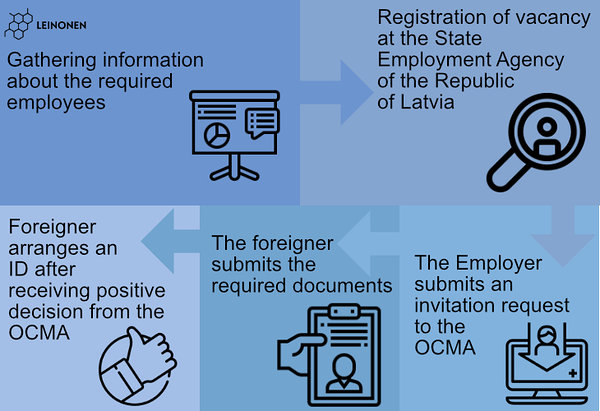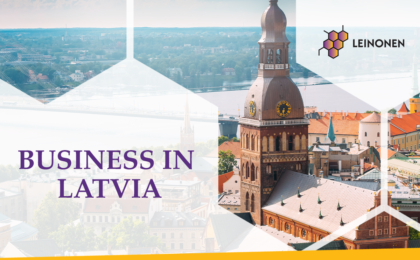Who is a foreigner?
According to the definition provided in the Immigration Law[1], a foreigner is a person who is not a Latvian national or non-citizen of Latvia. The Immigration Law distinguishes between two categories of foreigners:
o foreigner from a Member State of the European Union (hereinafter the EU), a state of the European Economic Area (hereinafter the EEA), and a state of the Swiss Confederation.
o third-country foreigner – a national of any country outside the Member States of the EU, states of the EEA, and Swiss Confederation.
Employing EU, EEA and Swiss Confederation nationals
A national of the EU Member States, EEA or Swiss Confederation enjoys the freedom of movement and residence. Thus, these foreigners do not need to obtain right to employment, and they can start employment relations in Latvia by entering into an employment contract.
Please note, if the said persons want to reside in Latvia longer than three months, they must obtain an EU citizen’s registration certificate at the Office of Citizenship and Migration Affairs (hereinafter the OCMA).
Employing third-country nationals
To employ third-country nationals in the Republic of Latvia, the persons need to obtain a temporary residence permit with right to employment in the Republic of Latvia, by following the procedure determined in regulatory enactments. The scope of right to employment depends on the grounds of requesting the temporary residence permit. A foreigner may obtain rights to employment:
o with restrictions, by entering into an employment contract with a particular employer, in a particular speciality (profession) or for part time, or by entering into another civil law contract (for example – service contract);
o to carry out business, if the person is a sole trader, board or council member recorded in the commercial register, procura holder, administrator, liquidator or member of a partnership with rights to represent the partnership, or a person who is authorised to represent the company (foreign company) in operations that are related to the branch, or a self-employed person;
o without restrictions.
An employer can employ highly qualified employees on the basis of the European Union Blue Card. The European Union Blue Card is a temporary residence permit issued in the Republic of Latvia for a foreigner who is being employed and carries out work for the agreed payment under the employer’s management in the Republic of Latvia, as well as who has acquired higher education in a study programme that lasts at least three years, in the respective speciality or industry indicated in the employment contract or who has professional experience of at least five years in the speciality or industry indicated in the employment contract.
What is the minimum monthly salary for a foreigner – third-country national?
Taking into account that income from the paid employment is the sole source of subsistence for the foreigner, then the set amount of minimum salary is significantly different from the amount of monthly salary determined in the country. The minimum monthly salary for the third-country national is as follows, depending on the grounds of the temporary residence permit:
o EUR 1,004 before taxes for an employed person;
o EUR 1,506 before taxes for a person who intends to obtain the European Union Blue Card;
o EUR 2,008 before taxes for an official registered in the commercial register, sole trader and self-employed person.
Procedure of employing a third-country national in the Republic of Latvia
1. Gathering information about the required employees
An employer should define the number of employees required from a third country, employee’s position, place of work performance and salary. The employee should determine requirements for qualification of the potential employee candidate for each position – education or job experience in the particular position.
2. Registration of a vacancy at the State Employment Agency of the Republic of Latvia (if applicable)
According to the defined criteria, the employer drafts a vacancy application to the State Employment Agency (hereinafter the SEA). A vacancy can be registered free of charge, remotely, by filling an application form addressed to the SEA in the portal http://www.latvija.lv/.
The vacancy application is not required where the employer intends to hire an employee on the grounds of the European Union Blue Card.
3. The employer submits an invitation request to the OCMA
If after registration at the SEA the vacancy remains unoccupied for 10 business days at least and the employer is sure about compliance of the candidate – third-country national with the vacant position and the imposed requirements, or if the vacancy registration at the SEA is not needed, then the employer submits an invitation request to the OCMA whereunder a particular third-country national is invited to employment in the Republic of Latvia at the particular employer.
Together with submitting the invitation request, the employer submits an employment contract or its draft to the OCMA and if the foreigner’s profession is not regulated, submits the foreigner’s education documents, or experience confirmation for the particular position. If the foreigner’s profession is regulated, the employer has to submit a recognition certification for the qualification document or a similar document that confirms compliance of the professional qualification with the requirements determined in the Republic of Latvia.
The employer is entitled to include the foreigner’s family members in the invitation request – spouse and under-age children if they plan to enter and reside in the Republic of Latvia together with the foreigner.
Please note that during the entire validity term of the employee’s temporary residence permit the employer undertakes liability for the foreigner’s departure from the country at the specific time, as well as, where needed, covers costs related to health care to the foreigners, residence in the Republic of Latvia and return to the home country.
The employer pays a state duty for the invitation request.
4. The foreigner submits the required documents
Upon approval of the invitation by the OCMA, the foreigner is entitled to submit the required documents to obtain the temporary residence permit. The OCMA approves the invitation request within 5 to 10 business days.
A foreigner who applies for the EU Blue Card is entitled to submit the required documents at any regional department of the OCMA in the territory of the Republic of Latvia.
On the other hand, a foreigner, who applies for a temporary residence permit on the grounds of employment, submits the documents to obtain the residence permit upon a prior appointment at one of the diplomatic missions or consular posts of the Republic of Latvia abroad.
The foreigner produces passport original (the passport validity term must exceed 6 months) to the official of the diplomatic mission or consular post and submits:
o copies of all passport pages,
o completed special-form questionnaire of the OCMA,
o full-colour passport-size photography,
o statement about absence of criminal record,
o original employment contract,
o written permit to declare a place of residence at the particular address in the Republic of Latvia.
If the foreigner’s family members apply for the temporary residence permit, the foreigner submits additionally:
o copies of all passport pages of each family member,
o documents that confirm kinship (for spouses – marriage certificate, for descendants – birth certificate),
o documents that confirm the required subsistence for each member of the foreigner’s family for one year.
o completed special-form questionnaire of the OCMA for each family member,
o full-colour passport-size photography for each family member,
o statement about absence of criminal record for each family member above the age of 14.
The foreigner pays state duties for each application for the temporary residence permit.
The diplomatic missions or consular posts of the Republic of Latvia and the OCMA accept documents in the Latvian, English, French, German or Russian languages. Document originals that have been prepared in other foreign languages need to have attached respectively notarised translations in the Latvian language. Public documents need to be legalised in compliance with international norms of law.
The document revision term (30 days, 10 business days or 5 business days) depends on the paid amount of the state duty.
5. At the OCMA, the foreigner arranges an identity card after receiving a positive decision from the OCMA
After the OCMA issues a positive decision to grant the residence rights with rights to employment to the foreigner, the foreigner needs to arrive in person at the OCMA with a valid travel document and visa and has to arrange an identity card (also the family members who received a positive decision on granting the residence permit).
In addition, the foreigner (and each family member) has to produce a statement from doctor-radiologist about absence of tuberculosis, as well as a health insurance policy. Moreover, the foreigners who have received the temporary residence permits have to declare their place of residence at the same time.
The Office of Citizenship and Migration Affairs issues the temporary residence permit for 5 years that requires annual registration. Upon annual registration of the temporary residence permit, the OCMA verifies payment of the personal income tax and mandatory state social insurance contributions and the paid amount from the sums that were specified in the documents upon application for the temporary residence permit.
Please note that each case of application for the temporary residence permit is reviewed separately depending on the inviter’s and foreigner’s subjective criteria. Thus, this article cannot serve as an exhaustive instruction how to act when applying for the temporary residence permit; it rather provides a practical insight in the process of applying for the temporary residence permit. To receive advice that corresponds to your particular situation, contact us.
[1] Immigration Law: Law of the Republic of Latvia. Published: Official gazette “Latvijas Vēstnesis”, 169, 20.11.2002; Latvijas Republikas Saeimas un Ministru Kabineta Ziņotājs (Reporter of the Parliament and the Cabinet of Ministers of the Republic of Latvia), 24, 27.12.2002.




